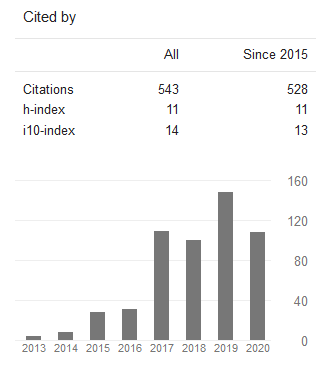Autonomous Cognitive Leveling Game Pada Serious Game Menggunakan Particle Swarm Optimization
DOI:
https://doi.org/10.24002/jbi.v8i2.1080Abstract
Abstract.
Serious games containing the pedagogical aspects and as part of the device/media e-learning support the learning process. Besides, the learning method uses the game are better than the conventional learning, because learning materials that involve animation in the game will enable long-term memory of students. Particle swarm optimization (PSO) method offers a search procedure based on a population consisting of individuals called particles that change their position with respect to time. PSO, by way of initializing the position and velocity of a particle, calculates the fitness function of the solution and updates the position and velocity of a particle to a stop condition are found. The design of PSO on the problem of autonomous cognitive levels of the game on a serious game with a permutation is proposed by using the fitness function the distance between xi+1 (cognitive level game) with xi (cognitive pre-test). The expected outcome of this research is the sequence of levels completed in accordance with the needs of the learner.
Keywords: Serious game, cognitive, pso
Abstrak.
Serious game sangat mendukung proses pembelajaran melalui permainan yang mengandung aspek pedagogis dan merupakan bagian dari alat/media e-learning. Selain itu metode pembelajaran menggunakan permainan lebih baik dibandingkan dengan pembelajaran konvensional, karena animasi materi pembelajaran dalam permainan akan mengaktifkan ingatan jangka panjang siswa.
Metode particle swarm optimization (PSO) menawarkan suatu prosedur pencarian berdasar pada populasi yang terdiri atas individu-individu yang disebut partikel, mengubah posisi mereka terhadap waktu. PSO dengan cara melakukan inisialisasi posisi dan kecepatan particle, menghitung fungsi fitness dari solusi dan mengupdate posisi dan kecepatan particle sampai kondisi berhenti ditemukan.
Perancanagan PSO pada permasalahan autonomus cognitive level game pada serious game diusulkan menggunakan permutasi dengan fungsi fitness jarak antara xi+1(cognitive level game) dengan xi (cognitive pre-test).Hasil yang diharapkan dari penelitian ini adalah adanya urutan level game yang sesuai dengan kebutuhan pembelajar.
Kata Kunci: Serious game, cognitive, pso
References
Anderson, L.W. & Krathwohl, D. 2010. Kerangka Landasan untuk Pembelajaran, Pengajaran, dan Asesment, diterjemahkan oleh: A. Prihantoro. Yogyakarta: Pustaka Pelajar.
Arnseth, H. C. 2006. Learning to Play or Playing to Learn - A Critical Account of the Models of Communication Informing Educational Research on Computer Gameplay. The international journal of computer game research, vol. 6, no. 1
Azhari. 2010. Pengembangan Model Monitoring Proyek Perusahaan Berbasis Multi Agen Cerdas. Disertasi, Program Studi S3 Ilmu Komputer, FMIPA UGM ,Yogyakarta.
Chen, C., Liu, C. & Chang, M. 2006. Personalized curriculum sequencing utilizing modified item respons theory for web-based instruction. Expert Syst Appl 30(2):378–396
Chen, C., Peng C. & Shiue, J. 2008. Ontology-based concept map for planning personalized learning path. In: Proceedings of the IEEE conference on cybernetics and intelligent systems, pp 1337–1342
Chase, W. G. & Simon, A.S. 1973. Perception in chess. Cognitive Psychology, vol. 4, pp.55-81.
Clark,R.E. (2010).Evaluating the Learning and Motivation Effects of Serious Games. Rosier school of Education Center for Creative Technologies. USC. Available: http://projects.ict.usc.edu/itgs/talks/Clark_Serious Games Evaluation.ppt. (28 Augustus 2010)
Conde, T. & Thalmann, D. 2005. Autonomous Virtual Agents Learning a Cognitive Model and Evolving. EPFL Virtual Reality Lab. IVA 2005. LNCS 3661, pp. 88-98. Springer-Verlag. London
Conati, C., & Klawe, M. 2011. Socially Intelligent Agents In Educational Games. AAAI Technical Report, FS-00-0 29 -44
De-Marcos, L., Barchino, R., Martı´nez, J., Gutie´rrez, J. & Hilera, J. 2008. Competency-based intelligent curriculum sequencing: comparing two evolutionary approaches. In: Proceedings of the IEEE/WIC/ACM international conference on web intelligence and intelligent agent technology, vol 3, pp 339–342
De-Marcos, L., Martinez, J., Gutie´rrez. J. A., Barchino, R. & Gutie´rrez, J.M. 2009 .A new sequencing method in web-based education. In: Proceedings of the IEEE congress on evolutionary education (CEC), pp 3219–3225
Djaouti, D., Alvarez,J., Jessel,J.P. & Rampnoux O. 2011. Origins of Serious Games. London : Springer-Verlag
Eberhart, R. & Kennedy,J. 1995. A new optimizer using particle swarm theory. In: Proceedings of the sixth international symposium on micro machine and human science. Nagoya, Japan.
Giani, Z.,CH,. 2014. Analisis Tingkat Kognitif Soal-Soal Buku Teks Matematika Kelas VII Berdasarkan Taksonomi Bloom. Jurnal Pendidikan Matematika, (Online) : http://ejournal.unsri.ac.id, diakses 22 Desember 2016.
Gutie’rrez, S., Valigiani, G., Collet, P. & Kloos, C.D. (2007). Adaptation of the ACO heuristic for sequencing learning activities. In: Proceedings of the EC-TEL poster session, Crete, Greece, September 17–20. doi:10.1.1.142.8362
Hartley, M., Fagard, J., Esseily, R. & Taylor J. 2008. Observational Versus Trial and Error Effects in a Model of an Infant Learning Paradigm. ICANN 2. Lecture Notes in Computer Science, Springer, vol. 5164, pp. 277-289.
Huang, M., Huang, H., & Chen,M. 2007. Constructing a personalized e-Learning system based on genetic algorithm and case-based reasoning approach. Expert Syst Appl 33:551–564
Lopes, R.S. & Fernandes, M.A. 2009. Adaptative instructional planning using workflow and genetic algorithms. In: Proceedings of the eighth IEEE/ACIS international conference on computer and information science.
Kebritchi, M., Hirumi, A. & Bai, H. 2010. The Effects of Modern Mathematics Computer Games on Mathematics Achievement and Class Motivation. Computers & Education, 55(2), 427-443.
Pitono, J. 2015. Optimasi Aliran Daya Berbasis Particle Swarm Optimization (PSO) untuk Menekan Emisi dan Biaya Operasional. Disertasi Teknik Elektro ITS Surabaya.
Russel, S. & Norvig, P. 2010. Artificial Intelligence A Modern Approach. New Jersey: Pearson Education, Inc.
Samai, A. & Mostafa, B. 2007. Re-use of resources for adapted formation to the learner. In: Proceedings of the international symposium on computational intelligence and intelligent informatics (ISCIII), pp 213–217.
Sarab, A.M.I., & Menai, M.E.B. 2011. Evolutionary computation approches to the curriculum sequencing problem. Nat Comput, Springer Sceince+Business Media B.V.
Smith, J. H. 2006. The Games Economists Play - Implications of Economic Game Theory for the Study of Computer Games. The international journal of computer game research, vol. 6, no. 1, pp. 1-15
Priya, D.A. 2015. Ant Colony Optimization for Competency Object Sequencing in e-learning, Applied Mathematics and Comnputation Journal 263, 332-341.
Wang, T., Wang, K. & Huang, Y. 2008. Using a style-based ant colony system for adaptive learning. Expert Syst Appl 34(4):2449–2464
Winn, B. M. 2011. The Design, Play, and Experience Framework. Games for Entertainment and Learning (GEL) Lab, Dept. of Telecommunication, Information Studies, and Media, Michigan State University
Winn, B. & Heeter, C. 2007. Resolving Conflicts in Educational Game Design Through Playtesting. Innovate Journal of Online Education, vol. 3, no. 2: 138 - 147
Wong ,L. & Looi, C. 2009 .Adaptable learning pathway generation with ant colony optimization. Educ Technol Soc 12(3):309–326
Woolridge, M. 2002. An Introduction to Multiagent Systems. Chichester : John Wiley & Sons Ltd.
Yang, Y.J. & Wu,C. 2009. An attribute-based ant colony system for adaptive learning object recommendation. Expert Syst Appl 36(2):3034–3047
Zyda, M.2005. From visual simulation to virtual reality to games. IEEE Computer Society, vol. 38, issue 9, pp. 25 – 32.
Downloads
Published
Issue
Section
License
Copyright of this journal is assigned to Jurnal Buana Informatika as the journal publisher by the knowledge of author, whilst the moral right of the publication belongs to author. Every printed and electronic publications are open access for educational purposes, research, and library. The editorial board is not responsible for copyright violation to the other than them aims mentioned before. The reproduction of any part of this journal (printed or online) will be allowed only with a written permission from Jurnal Buana Informatika.
This work is licensed under a Creative Commons Attribution-ShareAlike 4.0 International License.









